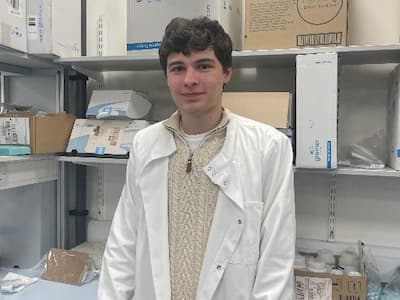Lancaster’s MSc in Biomedicine offers an intensive 12-month full-time or two-year part-time programme in a world-class environment.
You will be taught and supervised by research-active academics who are experts in the biological mechanisms underpinning human diseases and turning research discoveries into practical applications such as diagnostic tools and novel drug treatments.
Throughout the course, you will develop strong intellectual, practical and transferable skills, gaining a highly sought-after postgraduate qualification that opens doors across academia, industry and healthcare.
Why Lancaster?
- Study in a world-leading research environment – 100% of our research environment in the Faculty of Health and Medicine was rated "excellent" in the most recent UK Research Excellence Framework (2021)
- Explore a broad spectrum of biomedical research, including immunotherapy, neglected tropical diseases, neurological disorders, genome stability and cancer
- Evaluate the key stages of drug development, from initial discovery through clinical trials to regulatory approval and market release
- Build expert knowledge by undertaking your own independent research project
- Gain hands-on experience while applying biomedical techniques and problem-solving
- Become part of a community of people who are passionate advocates for academic curiosity and lifelong learning
Why should I choose an MSc in biomedicine?
You will gain a deep understanding of the molecular and cellular processes involved in human diseases and how innovative methods can be developed to diagnose, prevent and treat acute, chronic, and infectious diseases.
Through dedicated training in experimental design, data analysis and critical evaluation of scientific literature, you will be equipped for a fulfilling career in academic research, healthcare, biotechnology, pharmaceuticals or related sectors such as science communication and education.
Based in Lancaster’s Department of Biomedical and Life Sciences, our MSc in Biomedicine is aligned with our research themes in:
- Ageing and Neuroscience
- Cancer Biology and Genome Stability
- Microbes, Pathogens and Immunity
We specialise in both basic and translational research, advancing fundamental scientific discoveries and turning them into real-world health improvements such as diagnostic tools and new therapies.
Is this course suitable for me?
We welcome applications from graduates from a range of disciplines and backgrounds including:
- Those with an undergraduate degree in subjects such as Biology, Biomedical Sciences, Biochemistry, Pharmacology or Neuroscience.
- Those with an undergraduate degree in related subjects such as Chemistry, Pharmacy and Pharmaceutical Science with additional research or work experience in bioscience.
- Those with a strong interest in understanding how basic scientific research can lead to development of innovative new drugs for the treatment of acute, chronic and infectious diseases.
- Those who want to develop their research skills to progress to PhD study or research careers in industry, academia or in clinical settings.
What will I study?
You can choose from four taught modules that showcase the wide variety of biomedical research. You will also conduct a rigorous research project involving experimental design, data collection, and analysis. This combined approach will strengthen your practical skills, while fostering critical thinking and research independence.
You will have the option to study from a diverse array of cutting-edge topics in biomedicine that include neurological disorders, immunotherapy, neglected tropical diseases and cancer research. Each module focuses on how understanding fundamental molecular and cellular processes can be harnessed to advance human health.
You will also study a specialised module that equips you with the tools to critically evaluate the pathways from drug discovery to the clinic.
You may also choose modules delivered by Lancaster Medical School to develop your knowledge of how research is conducted in a healthcare and/or clinical setting and how healthcare research is communicated to bring about changes to policy and practice.
On which topics can I base my research?
Your taught modules serve as a foundation for your independent research project, which typically aligns with one of our core research themes and will be supervised by an experienced research-active member of our academic staff.
Diverse project options are available, such as:
- Developing a new treatment for snakebites
- Investigating the genetic risk factors for neurodegenerative diseases
- Examining how the immune system reacts to infections
- Studying aberrant gene expression in cardiovascular diseases
- Testing novel combination therapies for cancer
Whatever the topic, your dissertation offers a valuable opportunity to produce robust scientific arguments, formulate and test hypotheses and critically evaluate competing scientific theories.
Build skills for your future
In addition to developing your practical laboratory skills, your research project will further your autonomous problem-solving and decision-making skills and apply ethical principles within the context of biomedical research.
Throughout the programme, our academic staff will support, guide and challenge you to ensure that you graduate with the confidence, critical insight and expertise needed to thrive in your chosen career path.


